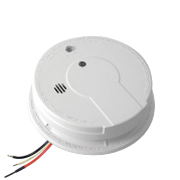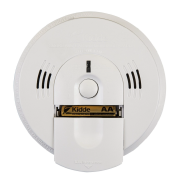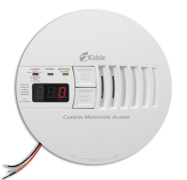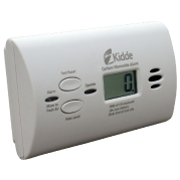Learn about
Smoke & Carbon Monoxide Detectors
We carry a full range of hard wired and battery-only model detectors for installation throughout your building where needed by Chicago code. When performing the servicing of your building's fire safety equipment, our technicians will perform the following procedures on all existing units:
- Check Replacement Date: units will be pro-actively replaced on the schedule defined by the manufacturer and listed on the device.
- Function Test: units will be tested to ensure each is functioning normally. Faulty or damaged units will be replaced.
- Battery Replacement: batteries will be pro-actively changed. (if applicable)
- Compliance Report: results of all testing recorded in the building's compliance report and uploaded to the Fire Safety Portal.
Smoke Detectors
A fire that begins in a common area of a building, such as a basement or mechanical room, can quickly spread undetected. Fires that occur at night are even less likely to be noticed by a resident. Once a fire starts, it can grow quickly. Smoke detectors provide residents with a warning that a fire or similar emergency exists and supplies critical time so that action can be taken.
For a condo association, you will generally need smoke detectors installed in the following locations: (Refers to common areas only)
- Stairwells: One unit required at the top of each stairwell.
- Basement: One unit should be installed in the basement.
- Electrical Rooms: One unit should be installed to protect these areas.
- Elevator Rooms: One unit should be installed.


Carbon Monoxide (CO) Detectors
Carbon monoxide is known as the “silent killer” because it is odorless, tasteless and colorless. If inhaled in high concentrations, carbon monoxide poisoning can happen quickly. This toxic gas is produced by any fuel-burning appliance or fixture, such as a furnace, water heater or gas dryer. Carbon monoxide can build up in a building from malfunctions or improper venting in these devices. Carbon monoxide detectors are a building's main line of defense against CO poisoning.


For a condo association, you will need a carbon monoxide detector installed in any room containing a heating unit that utilizes fossil fuel. (Refers to common areas only) For example, if your building has a centralized heating system that uses coal, natural gas, kerosene, oil, propane or wood as fuel, a carbon monoxide detector will be required in the same room as the heating system.
Carbon monoxide detectors should also be installed within rooms that contain hot water tanks or laundry dryers that use natural gas. Most condo associations and commercial properties have some type of gas-fueled equipment located within the common areas and will therefore require at least one CO detector.

